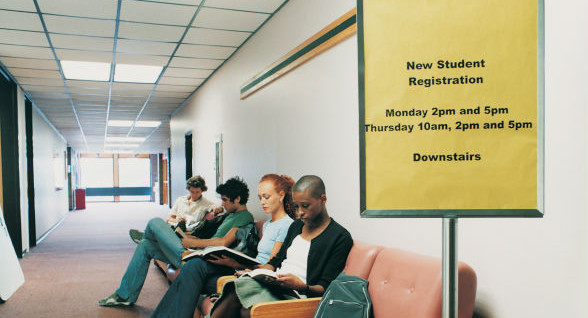Second Start Program Gives Students a Second Chance to Enroll
By Reyna Gobel
September 19, 2014
College launches a program that allows students who miss the original course enrollment deadline to get the credits they need without missing valuable class time.
Administrators at Louisiana’s Delgado Community College had a problem. Too many students were seeking late registration — in some cases, attempting to sign up for courses two and three weeks after the start of class.
Professors knew allowing students to enroll late would put them behind and negatively impact completion rates. On the other side, college officials didn’t want enrollment rates to suffer by barring students from courses they wanted or needed to take.
“If we tell [students] go ahead and come back in four months for a new term, they won’t come back,” explains Ashley Chitwood, executive dean of Delgado’s Northshore campus. The solution: a new Second Start program, with faster-paced courses that begin later in the semester.
How it works: The Second Start program allows any student who misses the original course enrollment deadline to enroll in an accelerated eight-week course (16-week courses are standard) later in the semester. The courses cover the same material, but meet more often and for longer sessions. The program launched in 2013 with 12-week courses. But the 12-week terms created problems with professors, most of whom were used to teaching 16-week fall or spring courses, or eight-week summer courses. The eight-week Second Chance courses, which began this fall, are the same length as a traditional summer course.
Because many Delgado students also work full-time, hybrid courses that include a combination of online learning and class time were created to ensure students don’t have to be on campus for double the time to accommodate the shorter eight-week term.
How it was developed: The program was developed in two weeks, a credit to the coordination of several departments at the college. Professors were needed to teach the courses. Financial aid had to develop a process for students to apply for and receive financial awards at a later date. The registrar had to set up registration systems that allowed for additional registration times. A communications team was developed to immediately let interested students know Second Start had replaced late registration.
Getting results: In spring 2014, Delgado says 169 students who were new to the college would not have enrolled if not for the Second Start program. In fall 2014, 347 new students enrolled exclusively in Second Start classes, with potentially more to enroll by the upcoming Oct. 7 deadline.
Looking for an alternative to late registration at your college? Chitwood offers the following tips for other colleges considering a Second Start option.
- Think carefully about length. Determine a course length that instructors will be comfortable with.
- Communicate effectively. Make sure students receive advanced communication about required textbooks, the registration process, financial aid, the first day of class, and the amount of work required for each class. Delgado’s first semester of Second Start saw a high number of students withdrawal, largely because students weren’t prepared to do the same amount of work in a shorter amount of time.
- Get on the same page with faculty. Discuss the process and the importance of rigor with you’re your professors. Make sure they know these are full-time programs and treat them as such.
- Offer courses that students need. Pick and choose your courses. It’s impossible to offer Second Start options for every class in your course catalog. Pick the ones that the largest number of students is likely to need, such as core classes.
- Coordinate across departments. Every employee at the college should participate in the program’s success. Make sure you coordinate with different departments, from financial aid to student services to registration.
Is your college considering alternatives to late registration? Share your strategies in the Comments.







